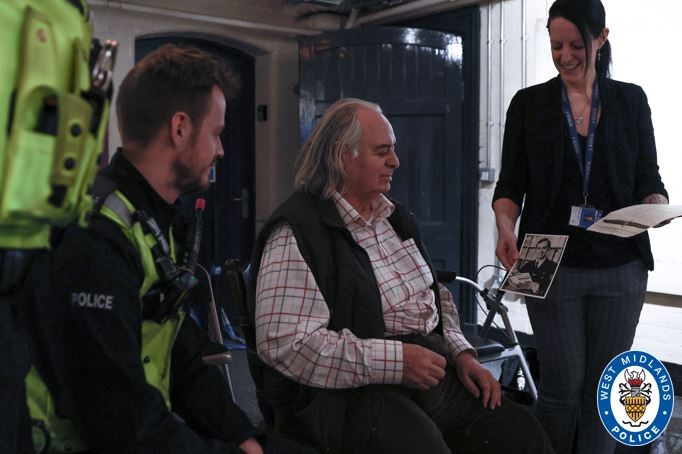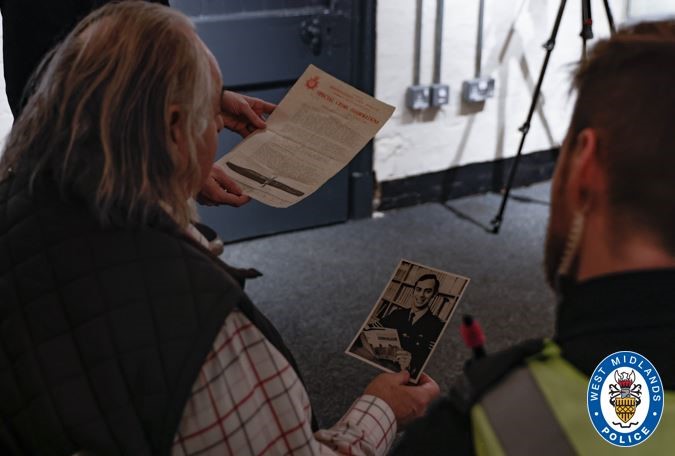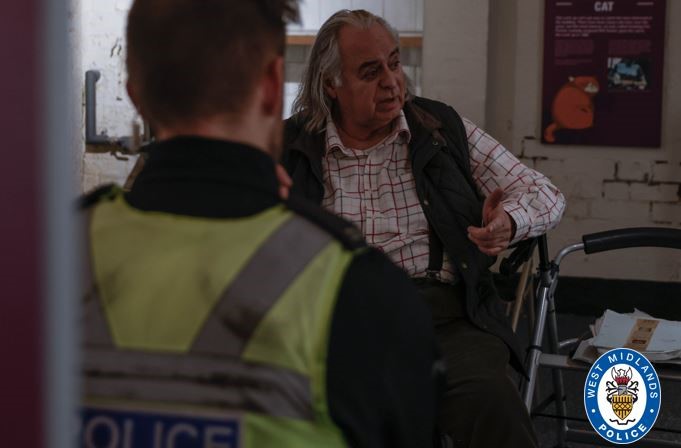Published on | #WeAre50, General
Lying stricken on the ground, drifting in and out of consciousness and with a nine inch knife embedded in his back, PC Gordon Law knew he had one last chance – he reached for his whistle in his uniform pocket and desperately blew for help.
That would be the last time an officer in Birmingham would signal for help by using a whistle as new technology namely a Pye Pocketfone Receiver was introduced just months later, the first two-way personal radio issued to officers.
West Midlands Police is celebrating its 50th anniversary this year and this month we are looking at how technology has changed during that time.
From whistles and police boxes, to contact centres and mobility devices, the world of policing and crime looks very different now compared to when Gordon first joined.

But it was the basic whistle which saved Gordon’s life as he was stabbed in the back when he discovered four young men stealing lead from the roof of a school in Balsall Heath back in January 1966.
Gordon, now aged 79, visited our WMP Museum in Steelhouse Lane this week to share his incredible story with police officers from our current Birmingham city centre team.
“I had been a police officer in the force for less than a year when I was stabbed,” said Gordon. “I was a fresh-faced 20-year-old working at the old Belgrave Police Station in Edgbaston. I was just easing myself into the job – little did I know how my whole world would change so quickly.”
Watch here: https://youtu.be/FdgG1yqm4FI.
Gordon’s world was to change forever on January 12 1966, shortly after 10.30pm, when he was on patrol and approached by someone who told him there were three people on the roof of a school stealing lead.
When he arrived on the scene there were two on the roof and one on the ground but Gordon didn’t see the fourth person – a lookout. As he fought the man he felt a blow to his back as he fell to the floor.
Gordon reached for his back and felt the 9 inch knife embedded to the hilt in his waist.

“I knew I was in a lot of trouble,” Gordon admitted. “I wasn’t in a lot of pain but I was getting weak. I knew I had to get help quickly. I reached for my torch and started flashing it to try and get someone’s attention but it was no good. I was drifting in and out of consciousness during this time.
“I then reached for my whistle in my pocket and blew that. No sound came out because it was covered in fluff. I removed the fluff from an indelible pencil I kept with my notepad and then blew the whistle again several times just hoping someone would hear it and come to help me.
“My whistle was heard by a family living close by and they sent out a young lad called Robert who was around 10 years of age who saw me on the floor and then raised the alarm.”
Gordon was left paralysed from waist down on the right side and spent months in hospital. The 19-year-old man who stabbed Gordon was sentenced to 10 years for attempted murder, grievous bodily harm and carrying an offensive weapon. He was released after just four years and 10 months.

Gordon was never able to work on the police frontline again. However, he carried on working with the force taking his Sergeant exams and went to work in the personnel department, before becoming a controller. He then took exams where he qualified to become a lecturer at Tally Ho.
Gordon went on to become an Inspector and helped to set up the original complaints and discipline department which is now the Professional Standards Department.
Listening to Gordon’s story Corinne Brazier, Heritage Manager at WMP Museum, said: “Gordon’s story is incredible and it is fascinating to hear how officers used the very basic technology at the time in their role. It is amazing to see how technology has moved on so much over the years from the basic whistle which Gordon was given to what officers are kitted out with today.”
Now officers have a full kit including radio, bodycam and an emergency red button they can press.
PC Joseph Tilt, said: “It was amazing to hear how Gordon used the kit he did have to get out of the situation he was faced with himself. As officers working today I think we take for granted the technology we have at our disposal now.”
